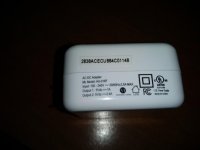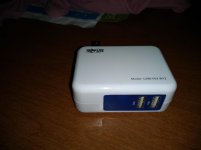Chuck(G)
25k Member
Okay, so most of our consumer electronics are manufactured in the Far East. I can deal with that.
But lately, the "cockroach in the spaghetti" has been the AC plugs on USB wall warts. The blades of same are most often solid pieces of metal (brass?) plated with nickel. Contrast this with a "normal" ungrounded AC plug whose blades are usually formed from a doubled piece of brass with some "spring" to it. Plug it into a wall receptacle and it won't fall out.
But the wall wart does fall out, particularly if there's any weight from a USB cable on it. I went out of my way to purchase a bunch of these specifically for the UL approval. But a device that doesn't stay firmly plugged into an outlet is hardly safe.
Does anyone have any suggestions for remedying this? I've tried spreading the blades a bit, but the darned things are just too slippery.
Perhaps I should deform or roughen up those blades. Anyone have their own solutions?
But lately, the "cockroach in the spaghetti" has been the AC plugs on USB wall warts. The blades of same are most often solid pieces of metal (brass?) plated with nickel. Contrast this with a "normal" ungrounded AC plug whose blades are usually formed from a doubled piece of brass with some "spring" to it. Plug it into a wall receptacle and it won't fall out.
But the wall wart does fall out, particularly if there's any weight from a USB cable on it. I went out of my way to purchase a bunch of these specifically for the UL approval. But a device that doesn't stay firmly plugged into an outlet is hardly safe.
Does anyone have any suggestions for remedying this? I've tried spreading the blades a bit, but the darned things are just too slippery.
Perhaps I should deform or roughen up those blades. Anyone have their own solutions?



